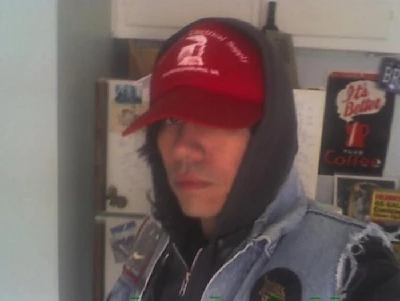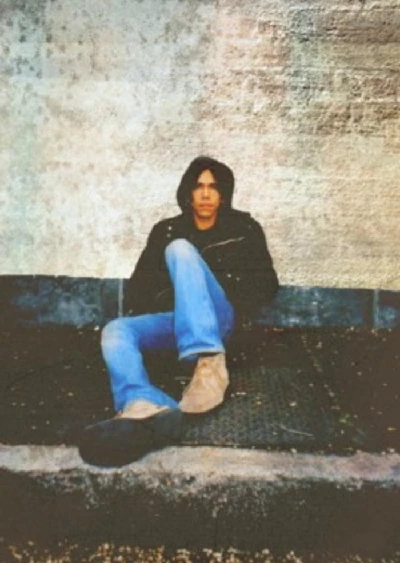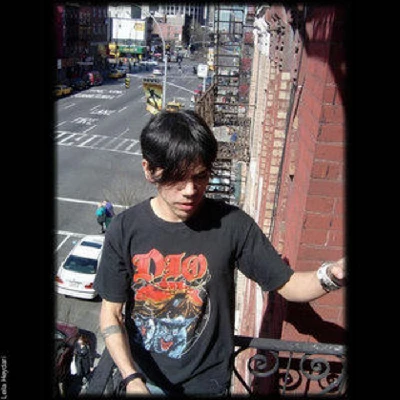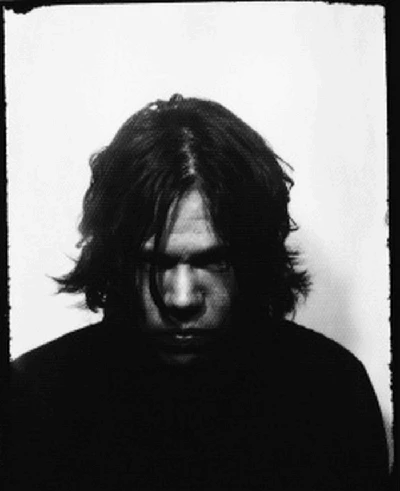Slint
-
Interview
published: 20 /
4 /
2008

One time Slint guitarist, David Pajo has since gone on to play with artists such as Tortoise and Will Oldham, had instrumental projects and currently plays with Dead Child, an old school heavy metal band. He speaks to Mark Rowland about the many different strands of his career
Article
For some Slint fans, David Pajo's current band Dead Child might be surprising. The band is basically an old school heavy metal band, all volume and flashy solos, with a name that's borderline inappropriate - a million miles away from the subtle dynamics of Slint. For fans of the rest of Pajo's vast back catalogue, however, it is probably less surprising. Over the past twenty plus years, Pajo has been an indie institution, playing with bands and artists as diverse as Tortoise, Stereolab and Will Oldham as well as numerous solo projects, from his instrumental Aerial M and Papa M projects to his more recent Pajo band, which featured Pajo singing for the very first time. In those bands, he has come up with some of the most distinctive and innovative guitar sounds this side of Sonic Youth - a guitar god for underground indie nerds.
He is, of course, still best known for his work with Slint, whose profile continued to grow long after the band had split up, casting a long shadow over it's ex-members, with all of them going to great lengths to try to step out from under it. In recent years, Slint have been playing together again and even played a new song on their tour last year. Dead Child was formed during Slint's first reunion tour in 2005, when Pajo and reunion tour bassist and guitarist Todd Cook and Michael McMahan (Slint’s Brian McMahan's younger brother) decided it would be fun to form a band in the mould of the bands they loved at school - bands like Iron Maiden, Metallica and Judas Priest. Drummer Tony Bailey and vocalist Dahm completed the line-up and the band started playing live in 2006. Now, they have released their debut full-length, 'Attack' through Quarterstick records.With more than a tip of a hat to the aforementioned 80s metal bands, the project is an attempt to capture a simpler time in the member's lives, when they were all in high school bands, meeting up in friends garages and basements, making noise and having fun. You get the impression that although the band is a project that they are all taking seriously, the main objective is to have fun with friends. It is unlikely to impress many fans of Pajo's other projects, who are used to a greater degree of subtlety from his music, but you get the impression that Pajo picks projects based on his own interests, rather than those of the fans of previous bands.
PB : You've just released an album with your band Dead Child. It's nice to hear a metal album that's not rubbish, It's been a while.
DP : Since I've been listening to metal and getting back into it again, it's amazing how much it's changed since I left that genre of music and did other things. It's almost unrecognisable; when I listen to contemporary metal bands I can't even hear the roots of it. I feel like we play a sort of old fashioned style of metal. For all the metalheads that were raised on all the death metal and all that from the 90’s, I think it must sound like Journey or something. It sounds so tame compared what else is out there right now, but we weren't trying to sound really brutal or anything like that. We were trying to make the kind fo music that got us excited when we were younger.
PB : What sort of things inspire the music you make with Dead Child, both musically and lyrically ?
DP : I guess musically the stuff that inspired us was the bands that we liked when we were younger that seemed to just stop around the late 80’s. There was the new wave of British heavy metal that evolved after Metallica picked it up and I think that was what we were going for. I think it's because that's what we all have in common musically. We all have different tastes in music. Lyrically I couldn't tell you, Dahm and Michael write all the words. When Dahm first came to me about the band he asked me 'What should I sing about?' and I said 'Well, you're like an encylopedia of horror fiction and horror films. Why don't you write about that?' so he came up with all these crazy lyrics.
PB : The name Dead Child is memorable to say the least. How did you come up with it ?
DP : That was Todd Cook. He was playing bass for us with Slint on the reunion tours and he plays in Shipping News and stuff. One of the things we used to talk about when we were on tour was like metal and all these bands we had in common. When he came up with the name, we were sitting in the van not talking for hours, because we both had headphones on. He turned to me and said 'I've just thought of a really good name for a metal band; Dead Child.' and we both laughed and didn't talk about it any more. The more I thought about it the more I realised that it was a kind of f**ked up name. That's actually how the band started; the name came first and the rest of it came after that.
PB : You've said that you envision Dead Child as a live force. How do you ensure that you achieve that ?
DP : I guess we just have to make the songs sound good live, as not only were we trying to go back to the sound of the bands we liked in the past we were also trying to go back to the methodology. When I was in Slint and we were rehearsing and in other bands I've been in, things seemed sort of unecessarily complicated. I started to wonder what had happened to just four or five guys just writing songs in the basement of their mom's house. That became the idea of the band, that everything would be simple in the way that it was when we were younger, in that we'd set up in a room and write songs together and if it sounded good we kept it. When we recorded we just practiced a lot and went in there and did it really fast. There's not many overdubs on that record at all. It's not locked to a grid, no drum samples. We didn't layer our guitars or anything like that. We just kind of did it. But I didn't want it to be like a punk rock record either; I didn't want it to sound like we didn't give a s**t. I wanted it to sound like the opposite, like we worked really hard to sound as good as we can.
PB : It sounds like it's quite a fun band to play in. What's the atmosphere like when you play together ?
DP : It's always pretty fun when we're all together. After Todd and I had the initial conversations about Dead Child, we would talk about who else could be in the band. We decided on people not on their musical ability but on our friendship with them. I wanted to be in a band where there wasn't any sort of weirdness, just old friends, so I guess that uncomplicated vibe we have between each other just comes off. When we get together we have a good time and there's a couple of alcoholics in the band so it mostly involves just drinking and talking s**t.
PB : How do you know that other members of the band ?
DP : I've known Michael for a really long time. My relationship with everyone is a little different. I've played in bands with Todd in the mid 90’s and I've played with Tony back then too, but Michael I've known since he was a little kid because he's Brian's brother and he used to come to practices and stuff. He actually came up with the name ‘Spiderland’. He was really into comic books and all this stuff, so he thought we should name the record that and we all loved it, so we used it. Dahm is the only guy I didn't know that well before this band, but Dahm was like Michael's childhood friend, so there's a dyamic between everybody that goes pretty far back.
PB : Does the people you work with always decide what projects you take on or is it the project itself ?
DP : It's both really. I'm trying to think back to all the people I've worked with. Sometimes there'll be a history that I have with someone, like when I joined Tortoise, I'd known John McEntire and Bundy (K. Brown) for a long time, so that seemed pretty natural. But when I played with Royal Trux or Stereolab, I didn't really know them that well, but I was a huge fan of the music so I guess it just sort of depends on the band and my camaraderie with them.
PB : You seem to take on a lot of jobs. Does it sometimes feel like you don't have enough hours in the day ?
DP : Yeah definitely. I think I do what most people do. You over-extend yourself and then you get to a point where you decide to simplify your life and you cut everything down and start over until you over-extend yourself again. I was thinking about that recently. When I was younger I always played in multiple bands because I played drums and guitar. When I was playing with Slint on the early stuff I was also playing drums for a hardcore band at the same time. So I always had two or three bands going. That was the only thing that kept me out of trouble. I was constantly wanting to play. I think nowadays I've settled down a little bit. I can only really manage one project at a time.
PB : Dead Child and your solo stuff as Pajo overlap a bit. Will you be working on that at the same time as Dead Child ?
DP : Right now, Dead Child's taken over. I can't find the motivation to do the solo stuff. After I did ‘1968’, which I didn't really tour for, I've done one or two solo shows. I think my motivation's gone, I can't find it for that stuff these days. I think it's because the Dead Child stuff is such a social thing and it's like fun to blow off steam and play loud, so the idea of me standing there playing these morose songs really bums me out. Also a lot of the songs were written about a time I don't really want to dwell on, so maybe eventually I'll get inspired to write a bunch of new songs, but it hasn't happened yet.
PB : You could just write an album of all happy songs, then you won't have that problem.
DP : (laughs) I'd love to, but it'd probably be really bad.
PB : It took a long time before you started singing on your record. What changed ?
DP : I guess I just got the confidence to do it. I was urged to do it by the guy who runs Drag City and Will Oldham and stuff. I was playing with Will and he wanted me to play with him on some of the songs. I gradually got comfortable with it and it was something I'd always wanted to do, I just never had the courage to do it. Because I didn't sing I didn't know what my voice sounded like. I covered that Misfits song, 'Last Caress' acoustically and that was the first time I'd ever heard my singing voice.
PB : You've done a couple of tours with Slint recently. It has been over ten years since you last played together. Why did you decide to play together again ?
DP : It was mainly down to Barry Hogan, the guy who does ATP. He would send me messages every now and again asking if Slint would play ATP. That was one thing he always wanted, for Slint to play. I said I'd ask the other guys, but I didn't think it was going to happen and it would always get shot down. It was just a surprise that year, I don't know what it was, if nobody had anything better to do or what, but Britt and Brian agreed to do it and I was really shocked, I was going to delete the e-mail that Barry had sent me and forget about it, but I forwarded it to the other guys and they were really into it. That got the ball rolling. We couldn't financially afford to just play one show and then break up. There was no way could do that, so we had to book a tour around ATP. It became a full-on reunion when initially it was just one show. After that, we realised that we really loved playing together, so we did it again in 2007 with the intention of writing new material and we actually started playing a new song - it's kind of a new old song. We started putting it together in 1994 when we briefly got back together. The idea was to make a whole new album, but that idea sort of fizzled out as the tour went on. I can't remember how it happened, but everything seemed to hit a wall. Everything just stopped. Now we're back to never playing again. It's a difficult band.
PB : Slint has cast a long shadow over your career. How do you feel about that ? Do you think the pressure of your reputation might have had something to do with Slint coming to a halt again?
DP : It could have had something to do with it, yeah. I was kind of resentful when Slint broke up, because I had all these other projects, like I'd be playing with Will or something and nobody would want to talk about that. They'd just want to talk about Slint. I sort of resented having to exist in the shadow of this high school band. It was more than that to me personally, but I considered it as part of my youth. I think at some point I just accepted that we managed to make this record and we should be pretty psyched to live in its shadow. I totally accept it now, I think it's a great record. It's kind of mysterious as well, even when we relearned everything, when we put all the parts together I couldn't work out where the mystery came from. I don't know how it happens. I guess I accept that I live in it's shadow and I never go into a band expecting it to be anything ground-breaking. Even back then we were just trying to do something that was unique to ourselves and hoped it would be something different.
PB : You've been involved in so many different bands and played many musical styles. What's the attraction of being so diverse ?
DP : I can't understand these bands who have one sound and stick with it for the rest of their lives. I think that's great. There are certain bands who have found something great and you don't want to change. But I've never been like that. It's not like I have some sort of disorder or something, but I definitely feel the need to do something I haven't done before like every day. I feel like doing the opposite of what I did yesterday.
PB : How do you decide what kind of music you're going to work on at any one time ?
DP : I guess I don't have a guideline, I just do whatever gets me excited in that moment and that's my only criteria. I feel like I kind of stick with something until I feel like I've understood it and I've had enough of it. I wonder about that too, when I was playing in Tortoise and some of the other bands, it seems that I Ieft them just before they started to get popular and I was thinking what's wrong with me ? Why don't I stay in the band while they're popular ? I think it's just I get to the point where I feel like I understand what the band is about and I feel like I want to do something new.
PB : You did a lot of instrumental solo stuff in the late 90s, with the M projects you had. Do you ever think you'll go back to that style in any way ?
DP : I love that stuff and I think if I do any more solo stuff it's going to be a cross between the aggressive stuff that I'm doing now and the stuff I did then. I'm starting to get back into being interested in instrumental music that doesn't use words to guide you through the song. It was cool that it was more abstract that the song had to mean something to you, rather than having a singer tell you what to think about. I think if I do any sort of solo thing again, it will be more in that style.
PB : You have a reputation as being a great indie guitar innovator and a lot of guitarists have taken inspiration from your style in some way. How do you feel about that ?
DP : I don’t know Britt and I had a band before Slint that was called Maurice and it was like a metal/hardcore crossover band. It was really just thrash. The last Maurice song became the first Slint song, because we'd started to get into different kinds of music and I started to like my guitars to sound cleaner and quieter. I wanted the melodies to be dissonant still, like the metal stuff, but I didn't want it to be as in-your-face. I'd spent all this time practicing like all this really flashy, show-off guitar and the idea with Slint was that none of that show-off stuff was going to happen. If anything I had to unlearn how to play the guitar and it was really cool I had to force myself to play really simple stuff and I think that idea kind of evolved in different ways and now I'm back to playing show-off guitar. I don't think I'm a good guitar player to be honest, I hear people nowadays and I can't do any of the stuff that they're doing. I practice a lot now and I just don't have the technique that the average metal guitar player has. That stuff is hard.
PB : Some of the Slint stuff sounds quite difficult to play even if it isn't.
DP : Yeah ,some of the Slint stuff is hard. That's partly why we don't have much showmanship. I always think people would find us really boring because we just sort of stand there. I'm just concentrating on not f**king up! It takes all my effort just to play the songs right. They're such simple melodies that if I play a wrong note, people are going to hear it. When you're playing that quietly it takes a lot of control. It's difficult in a different way to Yngwie Malmsteen.
PB : I imagine that in some ways Dead Child is easier for you to play because it's more about volume.
DP : Yeah that's true and the songs are - we try to play as tight as we can, but it's not locked in. We deliberately play loose. The idea behind the band is that it should breathe a little bit. It shouldn't sound protooled to death.
PB : So are you deliberately setting limitations for yourself with Dead Child ?
DP :Yeah, it's what I did with the Stereolab and the Papa M stuff, I sort of set myself some limitations or a box that we have to stay within them. With Arial M, it was like I only had two guitars and drums and that's all I had to work with, I couldn't use different tunings or anything like that I couldn't use any fancy effects, I had to make something cool out of it. With Dead Child it was kind of the same thing, though I'm not going to go through each rule. It's not like a retro thing. We're not trying to reproduce the sound of late 80s Judas Priest. It's whatever comes natural to each of us. I'm not the leader of the band, just one fifth of it. Everybody steps up and whatever strength somebody has that's the area of the band that they cover.
PB : I've heard that you play the banjo. Any chance you'll limit yourself to just playing the banjo for a future project ?
DP : (laughs) Yeah, in fact I was trying to work out what music I'll be playing when I'm like 80 years old, and I'm sure it's going to be something really weird, played on some weird stringed instrument that I've pieced together. I'm going to be this crazy old man playing this stick with a string on it. Maybe that'll be my next record.
PB : I guess a challenging limitation for you would be to make an album without any guitars on it. Have you ever considered that?
DP : Yeah, I'd love to do a full-on electronic album, but I guess there isn't time to try everything out. What ends up happening is that I end up doing a little bit of everything.
PB : Thank you.
Picture Gallery:-



